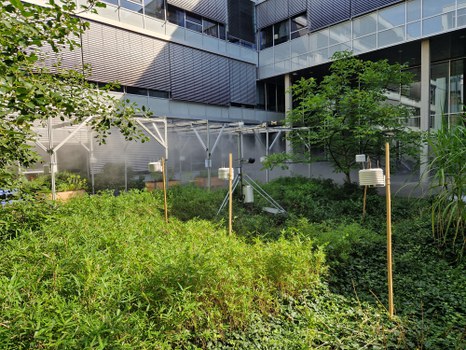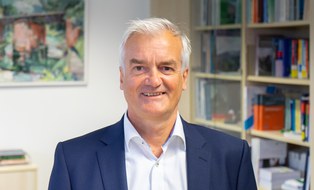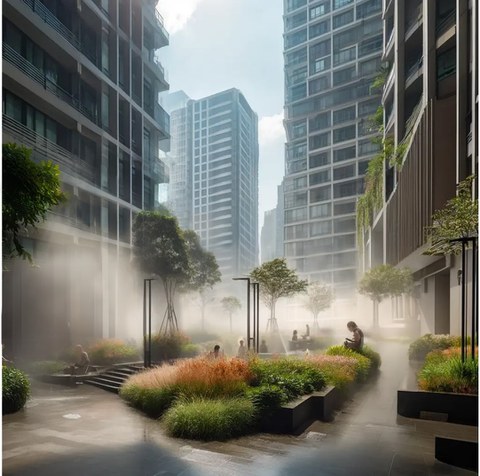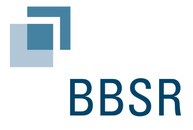Kühlpotenzial wasserbasierter Zerstäubungssysteme
Inhaltsverzeichnis
Kurzbeschreibung
Hitzebelastung in Städten erfordert zunehmend hohen Aufwand zur Gebäudekühlung. In Tropennächten kühlen Räume kaum ab, Arbeitsplätze sind nur eingeschränkt nutzbar und auch im urbanen Freiraum sind kühle Oasen rar. Verstärkt sind gesundheitliche und wirtschaftliche Folgen erwartbar. Besonders betroffen sind Blockstrukturen als typisches urbanes Wohn- und Arbeitsumfeld. Die vorhandenen Höfe tragen wegen geringer Vegetationsvolumina, Hitzestau und eingeschränkter nächtlicher Abstrahlung kaum zu natürlicher Kühlung bei.
Zur Verbesserung des Kühlpotenzials wird die Anwendung wasserbasierter Zerstäubungssysteme (Abk. ZS) in Höfen untersucht. Diese lassen geringeren Kühlungsaufwand durch Bereitstellung vorgekühlter Luft im Tagesbetrieb sowie beschleunigte nächtliche Abkühlung erwarten. Dazu können synergetisch kühlende Oasen im Freiraum entstehen, besonders, wenn Kühlung durch Bäume (z.B. auf Tiefgaragen) nicht möglich ist. Ferner ist eine Reduzierung des Wasserverbrauchs hitzebelasteter Vegetation zu erwarten.
Da der Betrieb von ZS zusätzliches Trinkwasser verbrauchen würde, wird die Aufbereitung und Speicherung von Regenwasser konzipiert. Es soll eine gesteuerte Verwendung des Wassers zur Verdunstung Im Sommer und zur Grundwasserneubildung in kühleren Monaten möglich sein. So wird eine Annäherung an die natürliche Wasserbilanz erreicht, die in Städten oft massiv gestört ist.
Im Projekt werden ZS unter Laborbedingungen und im Gebäudebestand real getestet und die Wirksamkeit über objektiv messbare sowie subjektiv empfundene Zielgrößen erfasst und ausgewertet. Höfe stellen dabei mikroklimatisch relativ abgeschlossene Einheiten mit definierten Bedingungen dar. Die Nutzung urbaner digitaler Zwillinge ermöglicht hochskalierte Klimasimulationen, sie dienen sowohl der Datenbereitstellung als auch der Ergebnisdarstellung und –auswertung. In Verknüpfung der Ergebnisse werden Planungshinweise zur Integration von ZS zur Kühlungsoptimierung in Neuplanungen und Bestand entwickelt.
Medien
Image-Film des Projekts © M. Schwöbel

© M. Jacob

© K. Uiboupin

© K. Uiboupin

© K. Uiboupin

© K. Uiboupin

© M. Schwöbel

© M. Schwöbel
Projektdaten
|
Kerninformation |
|
|
Zeitraum |
10/10/2024 - 31/01/2027 |
|
Art der Finanzierung |
Drittmittel |
|
Fördermittelgeber |
Bundesinstitut für Bau-, Stadt- und Raumforschung im Bundesamt für Bauwesen und Raumordnung |
|
TUD Forschungsprofillinien |
Energie, Mobilität und Umwelt › Wasserforschung |
|
Ziele für Nachhaltige Entwicklung (SDGs) |
SDG 6 – Sauberes Wasser und sanitäre Einrichtungen SDG 11 – Nachhaltige Städte und Gemeinschaften SDG 13 – Klimaschutzmaßnahmen |
|
Schlagwörter |
Stadtklima, Zerstäubungssysteme, Kühlung, Innenhöfe, Regenwassernutzung, Digitaler Zwilling |
Projektleitung
 © Andrè Terpe
© Andrè Terpe
Professor
NameHerr Prof. Dr.-Ing. Jürgen Stamm
Institutsdirektor, Professur Wasserbau, Bereichssprecher
Eine verschlüsselte E-Mail über das SecureMail-Portal versenden (nur für TUD-externe Personen).
Besuchsadresse:
Beyer-Bau, Raum 106 George-Bähr-Str. 1
01069 Dresden
Sprechzeiten:
Termine nur nach vorheriger Absprache (telefonisch oder Email)
Projektbearbeitung

Wissenschaftlicher Mitarbeiter
NameHerr Dr.-Ing. Ulf Helbig
Leiter Hubert-Engels-Labor
Eine verschlüsselte E-Mail über das SecureMail-Portal versenden (nur für TUD-externe Personen).
Besuchsadresse:
Beyer-Bau, Raum 107 George-Bähr-Str. 1
01069 Dresden
Sprechzeiten:
Bitte vereinbaren Sie im Voraus per E-Mail einen konkreten Termin.

Wissenschaftlicher Mitarbeiter
NameHerr Dipl.-Ing. Marc Anton Schwöbel
Eine verschlüsselte E-Mail über das SecureMail-Portal versenden (nur für TUD-externe Personen).
Besuchsadresse:
Beyer-Bau, Raum 136 George-Bähr-Str. 1
01069 Dresden
Projektpartner:innen
|
Partner:in |
Typ |
Website |
|
Institut für Landschaftsarchitektur, Professur Landschaftsbau (LABAU) der TU Dresden |
Intern |
|
|
Institut für Hydrologie und Meteorologie, Professur für Meteorologie (METEO) der TU Dresden |
Intern |
|
|
Institut für Siedlungs- und Industriewasserwirtschaft, Professur Siedlungswasserwirtschaft (SWW) der TU Dresden |
Intern |
Publikationen
-
Weitere Informationen
-
Förderung
Bundesinstitut für Bau-, Stadt- und Raumforschung im Bundesamt für Bauwesen und Raumordnung












